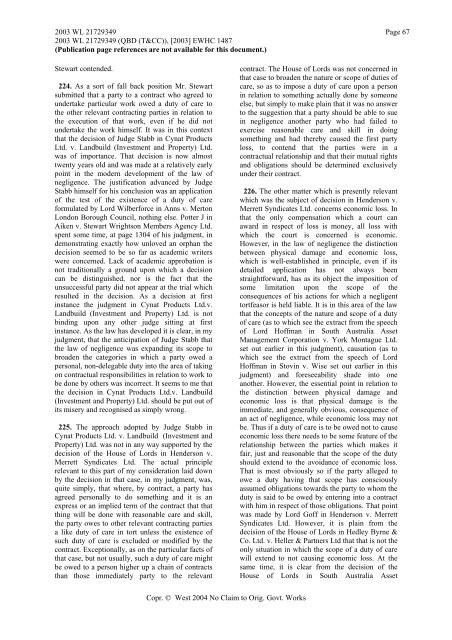Tesco v Constain - Thomson Reuters
Tesco v Constain - Thomson Reuters
Tesco v Constain - Thomson Reuters
Create successful ePaper yourself
Turn your PDF publications into a flip-book with our unique Google optimized e-Paper software.
2003 WL 21729349 Page 672003 WL 21729349 (QBD (T&CC)), [2003] EWHC 1487(Publication page references are not available for this document.)Stewart contended.224. As a sort of fall back position Mr. Stewartsubmitted that a party to a contract who agreed toundertake particular work owed a duty of care tothe other relevant contracting parties in relation tothe execution of that work, even if he did notundertake the work himself. It was in this contextthat the decision of Judge Stabb in Cynat ProductsLtd. v. Landbuild (Investment and Property) Ltd.was of importance. That decision is now almosttwenty years old and was made at a relatively earlypoint in the modern development of the law ofnegligence. The justification advanced by JudgeStabb himself for his conclusion was an applicationof the test of the existence of a duty of careformulated by Lord Wilberforce in Anns v. MertonLondon Borough Council, nothing else. Potter J inAiken v. Stewart Wrightson Members Agency Ltd.spent some time, at page 1304 of his judgment, indemonstrating exactly how unloved an orphan thedecision seemed to be so far as academic writerswere concerned. Lack of academic approbation isnot traditionally a ground upon which a decisioncan be distinguished, nor is the fact that theunsuccessful party did not appear at the trial whichresulted in the decision. As a decision at firstinstance the judgment in Cynat Products Ltd.v.Landbuild (Investment and Property) Ltd. is notbinding upon any other judge sitting at firstinstance. As the law has developed it is clear, in myjudgment, that the anticipation of Judge Stabb thatthe law of negligence was expanding its scope tobroaden the categories in which a party owed apersonal, non-delegable duty into the area of takingon contractual responsibilities in relation to work tobe done by others was incorrect. It seems to me thatthe decision in Cynat Products Ltd.v. Landbuild(Investment and Property) Ltd. should be put out ofits misery and recognised as simply wrong.225. The approach adopted by Judge Stabb inCynat Products Ltd. v. Landbuild (Investment andProperty) Ltd. was not in any way supported by thedecision of the House of Lords in Henderson v.Merrett Syndicates Ltd. The actual principlerelevant to this part of my consideration laid downby the decision in that case, in my judgment, was,quite simply, that where, by contract, a party hasagreed personally to do something and it is anexpress or an implied term of the contract that thatthing will be done with reasonable care and skill,the party owes to other relevant contracting partiesa like duty of care in tort unless the existence ofsuch duty of care is excluded or modified by thecontract. Exceptionally, as on the particular facts ofthat case, but not usually, such a duty of care mightbe owed to a person higher up a chain of contractsthan those immediately party to the relevantcontract. The House of Lords was not concerned inthat case to broaden the nature or scope of duties ofcare, so as to impose a duty of care upon a personin relation to something actually done by someoneelse, but simply to make plain that it was no answerto the suggestion that a party should be able to suein negligence another party who had failed toexercise reasonable care and skill in doingsomething and had thereby caused the first partyloss, to contend that the parties were in acontractual relationship and that their mutual rightsand obligations should be determined exclusivelyunder their contract.226. The other matter which is presently relevantwhich was the subject of decision in Henderson v.Merrett Syndicates Ltd. concerns economic loss. Inthat the only compensation which a court canaward in respect of loss is money, all loss withwhich the court is concerned is economic.However, in the law of negligence the distinctionbetween physical damage and economic loss,which is well-established in principle, even if itsdetailed application has not always beenstraightforward, has as its object the imposition ofsome limitation upon the scope of theconsequences of his actions for which a negligenttortfeasor is held liable. It is in this area of the lawthat the concepts of the nature and scope of a dutyof care (as to which see the extract from the speechof Lord Hoffman in South Australia AssetManagement Corporation v. York Montague Ltd.set out earlier in this judgment), causation (as towhich see the extract from the speech of LordHoffman in Stovin v. Wise set out earlier in thisjudgment) and foreseeability shade into oneanother. However, the essential point in relation tothe distinction between physical damage andeconomic loss is that physical damage is theimmediate, and generally obvious, consequence ofan act of negligence, while economic loss may notbe. Thus if a duty of care is to be owed not to causeeconomic loss there needs to be some feature of therelationship between the parties which makes itfair, just and reasonable that the scope of the dutyshould extend to the avoidance of economic loss.That is most obviously so if the party alleged toowe a duty having that scope has consciouslyassumed obligations towards the party to whom theduty is said to be owed by entering into a contractwith him in respect of those obligations. That pointwas made by Lord Goff in Henderson v. MerrettSyndicates Ltd. However, it is plain from thedecision of the House of Lords in Hedley Byrne &Co. Ltd. v. Heller & Partners Ltd that that is not theonly situation in which the scope of a duty of carewill extend to not causing economic loss. At thesame time, it is clear from the decision of theHouse of Lords in South Australia AssetCopr. © West 2004 No Claim to Orig. Govt. Works
















